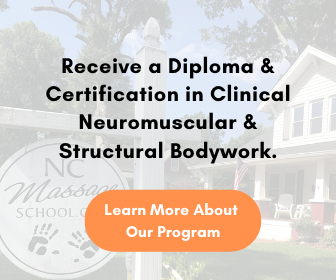For patients dealing with soft tissue injuries, massage therapists who can offer neuromuscular therapy can help bring relief to the pain and a full recovery. If you are not already offering this treatment at your clinic or practiced, you may wish to learn more about it. Here is some information about this effective treatment, including how and why it works.
 What Is Neuromuscular Therapy?
What Is Neuromuscular Therapy?
Neuromuscular therapy uses soft tissue manipulation to help improve nervous system function and the overall function and alignment of the skeletal system. Using static pressure, neuromuscular therapists place a consistent amount of pressure on a specific area of the body, helping to reduce pain and tension effectively.
Where Is Neuromuscular Therapy the Most Effective?
Neuromuscular therapy is effective in several areas, but specifically it can bring improvement to areas suffering from whiplash, biomechanical dysfunction, nerve compression or postural distortion. Patients suffering from ischemia or who have pain from myofascial trigger points can also benefit from the application of neuromuscular therapy.
Why Does Neuromuscular Therapy Work?
When the body experiences a muscular injury, the natural response is to narrow the blood vessels that flow to that area of the body. This is important, because it stops bruising, but it can also lead to a tightening of the muscle. If left untreated, the muscle becomes hypertonic, and a buildup of toxins can cause a reduction in circulation (ischemia). The toxins can increase nerve sensitivity and cause pain. The tight muscles can also pinch nerves and other muscle tissue, leading to even more pain.
Neuromuscular therapy targets the underlying cause of this pain by loosening these tight (hypertonic) muscles. This restores natural circulation and breaks down the toxins, reducing pain. Soon the muscles return to normal function, and the body comes back in balance.
Neuromuscular therapy is quite effective at reducing a wide range of pain syndromes and headache problems. It is a safe, natural solution that provides an alternative to pain relieving drugs, and can be used on most patients. However, those who have suspected fractures or torn tendons or muscles should not undergo the therapy. Inflammatory conditions, like arthritis, may limit the ability of the therapist to apply pressure. Patients should always consult with their doctors about the treatment before moving forward.

